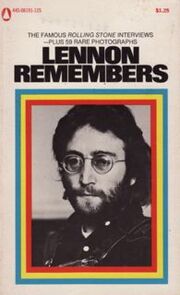
Lennon Remembers is a 1971 book by Rolling Stone magazine co-founder and editor Jann Wenner. It consists of a lengthy interview that Wenner carried out with former Beatle John Lennon in December 1970 and which was originally serialised in Rolling Stone in its issues dated 21 January and 4 February 1971. The interview was intended to promote Lennon's primal therapy-inspired album John Lennon/Plastic Ono Band and reflects the singer's emotions and mindset after undergoing an intense course of the therapy under Arthur Janov. It also serves as a rebuttal to Paul McCartney's public announcement of the Beatles' break-up, in April 1970.
Accompanied by his wife, Yoko Ono, Lennon aired his grievances to Wenner about the Beatles' career and the compromises the band made during their years of international fame. He makes cutting remarks about his former bandmates, particularly McCartney, as well as associates and friends such as George Martin, Mick Jagger and Derek Taylor, and about the group's business adversaries. Lennon portrays himself as a genius who has suffered for his art. He also states his disillusion with the philosophies and beliefs that guided the Beatles and their audience during the 1960s, and commits to a more politically radical agenda for the new decade.
Although Wenner's decision to re-publish the interview was done without Lennon's consent, the book helped create an enduring image of Lennon as the working-class artist dedicated to truth and lack of artifice. While some commentators question its reliability, the interview became a highly influential piece of rock journalism. It also helped establish Rolling Stone as a commercially successful magazine.
Interview content[]
Lennon discussed the Beatles' history, giving details that were little known beforehand. Among these was the first public confirmation of Brian Epstein's homosexuality. According to author Peter Doggett, the interview represents a piece of concept art that matches the raw emotional content of Lennon's Plastic Ono Band album. As with Lennon's new music, it reflected the principles of primal therapy in its engagement with, and rejection of, the past and associated emotional pain.
Inauthenticity of the Beatles[]
Lennon begins by saying that Plastic Ono Band is "the best thing I've ever done". He states his satisfaction with tracks such as "Mother", for its sparse sound and unadorned arrangement; "Working Class Hero", as "a song for the revolution"; and "God", in which he disavows his former beliefs and "myths", including the Beatles, before announcing that "The dream is over". He tells Wenner: "I'm not just talking about the Beatles, I'm talking about the generation thing. It's over, and we gotta – I have to personally – get down to so-called reality."
By comparison, Lennon denigrates most of the Beatles' work as dishonest. He highlights his compositions "Help!", "In My Life", "Strawberry Fields Forever" and "Across the Universe" as examples of the "truth" he brought to the band's music. He says that, with Ono's influence, his songs on the White Album represent a sustained study in first-person narrative and therefore authenticity in his art. When asked about his former bandmates' recent solo releases, he describes McCartney's self-titled album as "rubbish" and says that Plastic Ono Band will most likely "scare him into doing something decent". Lennon says he prefers Harrison's All Things Must Pass to McCartney, but qualifies the comment by saying: "Personally, at home, I wouldn't play that kind of music ... I don't want to hurt George's feelings, I don't know what to say about it." He similarly describes Starr's Beaucoups of Blues as "good" but says: "I wouldn't buy it, you know ... I didn't feel as embarrassed as I did about his first record [Sentimental Journey]."
He identifies himself as a "genius" whose talents were overlooked or ignored since childhood, by school teachers and by his aunt, Mimi Smith, who brought him up following the death of his mother. According to Lennon, this genius was similarly belittled or compromised by the expectations of fans and music critics, who favoured the conformist, "Engelbert Humperdinck" side of the Beatles, as represented by McCartney. When discussing the Lennon–McCartney songwriting partnership, Lennon identifies himself as the artist and truth-teller, and McCartney as a commercially focused tunesmith. He complains that, as an artist, having to play the part of a Beatle was "torture", adding: "I resent performing for fucking idiots who don't know anything. They can't feel ... They live vicariously through me and other artists ..." He denigrates the band's US fans at the height of Beatlemania, saying that American youth in 1964 displayed a clean-cut, wholesome appearance yet represented an "ugly race". Regarding rock critics, he states: "What do I have to do to prove to you son-of-a-bitches what I can do, and who I am? Don't dare, don't you dare fuckin' dare criticize my work like that. You, who don't know anything about it. Fuckin' bullshit!"
Lennon says that the Beatles' image was sanitised by their agreeing to Epstein's requirement that they wear suits and curb the riotous behaviour that had been a feature of the group's stage shows in Hamburg in the early 1960s. He says that with their international fame, the band's existence became a constant humiliation in which they were denied the freedom to speak out about global issues and their artistic integrity was lost. He dismisses the 1968 book The Beatles – the band's authorised biography written by Hunter Davies – as a further example of their image being whitewashed for the public. Lennon says that he himself allowed his Aunt Mimi to remove the "truth bits" about his childhood in Liverpool, but that Davies omitted any mention of drug-taking or the "orgies" taking place during the Beatles' concert tours. Lennon likens these backstage and hotel parties to the debauchery depicted in Frederico Fellini's film Satyricon. He blames the Beatles' audience for idolising the false image and reinforcing the myth surrounding the band.
LSD, Maharishi and primal therapy[]
Lennon discusses his consumption of hallucinogenic drugs such as LSD, saying that he and Harrison were the most adventurous with the drug, and claiming that he himself had taken "a thousand trips". He agrees with Ono that LSD and his subsequent absorption in meditation under Maharishi Mahesh Yogi were "mirrors" to his own identity. Lennon recounts his and Harrison's final meeting with the Maharishi before the pair left his ashram in India. Lennon says that Janov's primal therapy is another "mirror", but it has freed him from his natural introspection.
McCartney and Beatles associates[]
Amid his complaints about the Beatles, Lennon especially targets McCartney. He says that after Epstein's death in 1967, McCartney assumed a leadership role, but it took the band "in circles". He characterises McCartney as controlling and self-interested, saying that McCartney treated himself and Harrison as sidemen. Lennon identifies Let It Be as a project "by Paul for Paul", in which scenes featuring Lennon and Ono were excised to show McCartney as a more powerful force. Lennon heavily criticises his bandmates for their coldness towards Ono and their failure to recognise her as a creative equal. He says that while Starr was more accepting, he could never forgive Harrison and McCartney for their dismissal of Ono. He attributes the couple's descent into heroin addiction to the disapproval they received from the Beatles and those close to the band.
Lennon dismisses producer George Martin's contribution to the Beatles' music, saying that Martin was merely a "translator". He pairs Martin with the Beatles' former music publisher, Dick James, as two associates who took credit for the band's success when in fact it was only the four Beatles who were responsible. Lennon says: "I'd like to hear Dick James' music and I'd like to hear George Martin's music, please, just play me some ... People are under a delusion that they made us, when in fact we made them." He then attacks the Beatles' long-serving aides Peter Brown, Derek Taylor and Neil Aspinall as having believed they too were part of the Beatles. According to Lennon, these individuals represented a false illusion among the staff at Apple, whereby the Beatles provided a "portable Rome" in which Brown, Taylor and Aspinall felt entitled to a position beside "the Caesars".
Lennon portrays Klein as the saviour of the Beatles' finances against entrepreneurs such as Lew Grade and Dick James. He says that Klein brought a working-class honesty to their business dealings and that this contrasted with the snobbishness of Lee Eastman, who was McCartney's choice over Klein. In Lennon's description, by siding with Eastman, McCartney had adopted a business stance that said: "I'm going to drag my feet and try and fuck you." Lennon also says that he left the Beatles in September 1969 but acquiesced to McCartney and Klein's urging that his departure be kept private, for business reasons, yet McCartney then turned his own departure into a public "event" in order to promote his first solo album.
Rock music, art and politics[]
He identifies 1950s rock 'n' roll and his latest work as the only valid form of rock music. He criticises the Rolling Stones for slavishly copying the Beatles, and questions the Stones' reputation as a more political and "revolutionary" group than the Beatles. Lennon attacks Mick Jagger personally, saying that, as the Stones' singer and frontman, he "resurrected 'bullshit movement,' wiggling your arse" and "fag dancing". He says that Bob Dylan's adoption of a pseudonym was a "bullshit" affectation, and dismisses Dylan's recently released New Morning as an album that "doesn't mean a fucking thing". By comparison, he views Ono's work as more interesting than Dylan and McCartney combined. He expresses his gratitude to Ono for introducing him to the conceptual art of Marcel Duchamp. Lennon states his allegiance to New Left politics and support for the avant-garde
